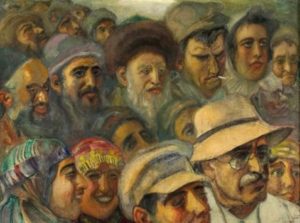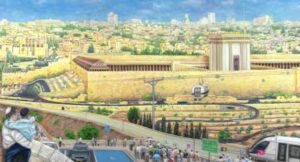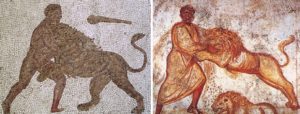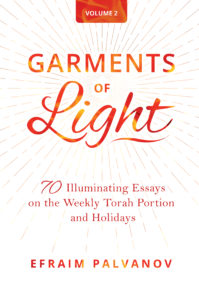This week’s parasha, Vayikra, begins the third book of the Torah. The parasha is unique in that it is only one of two parashas (along with next week’s Tzav) where the word Mashiach appears. All four cases of the word in the Torah refer to the anointed High Priest, not to the messiah at the End of Days. Nonetheless, on a deeper level it certainly is alluding to the messiah of the End of Days. All the verses in question deal with the anointed High Priest (“HaKohen HaMashiach”) atoning for sins—both his own and the people’s—and purifying his nation. Indeed, one of the roles of Mashiach will be to prepare Israel for that final purification at the End of Days. This includes identifying one last Red Cow to produce those special waters which alone are capable of removing the impurity of death.
The early Christians saw these verses as allusions to their purported saviour, Jesus. In one place, for example, they wrote:
the Law [ie. the Torah] made those high priests who had infirmity, and who needed daily to offer up sacrifices, first for their own sins, and then for the people’s; but our high priest, Christ Jesus, was holy, harmless, undefiled, and separate from sinners, and made higher than the heavens. (Hebrews 7:27-28)
For the Christians, Jesus was the ultimate anointed high priest. Yet, Jesus accomplished essentially nothing of what Mashiach is supposed to. This was perhaps best explained in the 16th century by Isaac ben Abraham of Troki (1533-1594). He was a Karaite Jew, and a renowned Karaite scholar. His magnum opus was a book called Hizzuk Emunah, “Strengthening of Faith”, written to debunk Christianity, silence missionaries, and convince Jews to remain Jewish. The book was so popular that it spread like wildfire, not just among Karaites but all Jews, and even Christians. In fact, it played an important role in the start of the Enlightenment, leading countless Christians to abandon their faith. One of these was the French philosopher Voltaire (1694-1778), who called the Latin translation of Hizzuk Emunah (first published in 1681) a “masterpiece”.
Because it was a Karaite text, traditional rabbis were wary of consulting it. The great Rabbi Menashe ben Israel (Manoel Dias Soeiro, 1604-1657), who opened the first Hebrew printing press in Amsterdam in 1626, ultimately refused to print it. Still, Abba Hillel Silver, in his A History of Messianic Speculation in Israel (pg. 225), points out how Troki’s text borrowed from earlier Rabbinic texts, including Mashmia Yeshua, “Announcing Salvation”, of Rabbi Isaac Abarbanel (1437-1508).
Silver goes on to summarize the sixth chapter of Troki’s Hizzuk Emunah, which includes a list of twenty clear prophecies in Scripture that must be fulfilled upon the coming of Mashiach—none of which were fulfilled by Jesus (thereby necessitating for Christians some future “second coming” yet to materialize after nearly two millennia). Briefly going over these twenty events is enlightening both as a reminder for why Jesus could not be the messiah, and for what to expect when the true Mashiach does come.
Living Waters and Dead Waters
The first prophecy is the return of the Lost Tribes of Israel. In ancient times, following the reign of King Solomon, the Twelve Tribes of Israel split into two kingdoms: the southern Judah and the northern Israel (or Ephraim). The more sinful northern kingdom was eventually overrun by the Assyrians, who exiled its tribes. These are sometimes referred to as the Ten Lost Tribes. It should be noted, though, that they weren’t necessarily ten tribes, nor were the tribes completely expunged. In reality, there were many Benjaminites, Simeonites, and Levites already living inside the Kingdom of Judah, and members of all the northern tribes fled to Judah when the northern kingdom was destroyed.
What happened was that all the tribes eventually assimilated into the larger, ruling tribe of Judah. Over time, the tribes lost knowledge of their lineage, and today everyone is simply a Yehudi, a Judahite, or Jew. (Levites, because of their unique role, retain knowledge of their ancestry). One of the prophesied events of the End of Days is that the identity of the Lost Tribes will once more be known. Though this idea is much more developed in later Rabbinic literature, it comes from numerous places in Scripture. Troki chooses to use Ezekiel 37:15-22:
And the word of God came to me, saying: “And you, son of man, take one stick, and write upon it: For Judah, and for the children of Israel his companions; then take another stick, and write upon it: For Joseph, the stick of Ephraim, and of all the house of Israel his companions; and join them one to another into one stick, that they may become one in your hand… And say to them: ‘Thus says the Lord God: Behold, I will take the children of Israel from among the nations, wherever they have gone, and will gather them on every side, and bring them into their own land…’”
Related to this is the second great prophecy, that of Gog u’Magog. This refers to the great world war at the End of Days, described in detail in Ezekiel 38, among other places. During the course of this war, Zechariah 14:4 states that the Mount of Olives in Jerusalem will be split in half. Then, new “living waters” will go out of Jerusalem to make Israel flourish (Zechariah 14:8).
Meanwhile, Isaiah 11:15 states that God “will utterly destroy the tongue of the Egyptian Sea; and with His scorching wind will He shake His hand over the River, and will smite it into seven streams, and cause men to march over dry-shod.” The identity of the “Egyptian Sea” and the “River” is unclear, though Silver has it as the Red Sea and the Euphrates. On the possibility of the Red Sea drying up, we know today from geological records that the Red Sea had once (and possibly more than once) become a dry chunk of land due to the narrow and shallow Bab-el-Mandeb closing up.
As for the “River”, in context it would make more sense if it referred to the Nile, the lifeline of Egypt. Today, we are indeed seeing the Nile drying up rapidly, and the Washington Post recently reported that the Nile Delta is losing as much as 20 metres per year in some areas. With this in mind, when Isaiah prophesies that the “tongue of the Egyptian Sea” will be destroyed, it may be referring to the Nile Delta, which opens up into the Egyptian Mediterranean, ie. the “Egyptian Sea”. The Post article is quite an accurate realization of Isaiah’s prophecy, with images of men that “march over dry-shod”.
(Having said that, the Euphrates River isn’t doing much better than the Nile, so whether Isaiah meant the Nile or the Euphrates is irrelevant in light of the mass devastation that has plagued both rivers.)
A Renewed Jerusalem
The sixth prophecy in Troki’s list is also from Zechariah (8:23):
Thus said the Lord of Hosts: “In those days it shall come to pass, that ten men shall take hold, out of all the languages of the nations, shall take hold of the garment of him that is a Jew, saying: We will go with you, for we have heard that God is with you.”
The tremendous anti-Semitism that Jews have experienced throughout history, into the present day, will finally end. The nations will be at peace with the Jews, and wish to learn from them. This is related to another prophecy: that gentiles from all over the world will come to Jerusalem to worship the God of Israel on every Rosh Chodesh and every Shabbat (Isaiah 66:20-23):
“…upon horses, and in chariots, and in litters, and upon mules, and upon swift beasts, to My holy mountain Jerusalem,” said God, “as the children of Israel bring their offering in a clean vessel into the house of God. And of them also will I take for the priests and for the Levites,” said God. “For as the new heavens and the new earth, which I will make, shall remain before Me,” said God, “so shall your seed and your name remain. And it shall come to pass, that from one new moon to another, and from one Sabbath to another, all flesh shall come to worship before Me, said God.
The gentiles—“all flesh”—will come to Jerusalem, upon every kind of transport. One of these is a rekhev, “chariot” in ancient Hebrew, and “vehicle” in Modern Hebrew. Another two of the transports are unique words that aren’t found elsewhere in Scripture and are impossible to translate: a tzab, and a kirkar. It is possible that the former refers to some kind of slow transport (as the word is written the same as that for a “turtle”) while the latter conversely refers to a very fast form of transport. In our day and age we have no shortage of either.
Troki lists separately a related prophecy from Zechariah (14:16): “And it shall come to pass, that every one that is left of all the nations that came against Jerusalem shall go up from year to year to worship the King, the Lord of Hosts, and to keep the feast of tabernacles.” Once a year, during the holiday of Sukkot, those nations that warred against Israel at the End of Days will come to Jerusalem to worship. The fact that it must be during Sukkot is no coincidence, for it is during Sukkot that our Sages say the offerings in the Temple atone for all the gentiles. This is why the Torah requires seventy bulls to be offered over the course of the holiday, corresponding to the seventy root nations of the world.
A Renewed World
If all the nations are coming to worship the God of Israel in Jerusalem, there is certainly no need for any “idols… false prophets… and unclean spirits” which God will entirely “cut off” (Zechariah 13:2). Zechariah further adds: “And God [YHWH] shall be King over all the earth; in that day God shall be One, and His name one.” (14:9) There will be world peace (Isaiah 2:4, Micah 4:3), which will be ensured and enforced by Israel, to whom all the kings and nations will listen (Isaiah 60:10-12, Daniel 7:27). Even the animals will be at peace with each other, as Isaiah (11:6-8) famously writes:
And the wolf shall dwell with the lamb, and the leopard shall lie down with the kid; and the calf and the young lion and the fatling together; and a little child shall lead them. And the cow and the bear shall feed; their young ones shall lie down together; and the lion shall eat straw like the ox…
On that last prophecy there is an interesting debate. Will the animals miraculously stop fighting and consuming one another? Or, is the prophecy only metaphorical and the natural order will remain? The Rambam (Rabbi Moshe ben Maimon, 1135-1204) held by the latter. Silver translates here that peace will be “between wild and domestic animals”. When reading Isaiah’s verses, this makes perfect sense: a wolf with a lamb, a leopard with a goat; calf and lion, cow and bear. So perhaps what Isaiah meant is that farmers and ranchers will no longer have to worry about wild animals devouring their livestock—once a common, and particularly disturbing, problem. (Or maybe there will be no need to raise livestock at all, for we are now at the dawn of the synthetic meat revolution.)
Israel will finally be completely righteous and free of sin (Deuteronomy 30:6, Isaiah 60:21, Ezekiel 36:25), and lead the rest of the world in doing the same (Jeremiah 3:17). There will no longer be any kind of suffering or sorrow in Israel, for the prophet said “the voice of weeping shall be no more heard in her, nor the voice of crying” (Isaiah 65:19).
Finally, the prophet Eliyahu will return (Micah 3:24), and the Temple will be rebuilt (Ezekiel 40-45). The Shekhinah will return to Israel (Ezekiel 37:26), as will the ability to prophecy (Jeremiah 31:32-33), and there will be great knowledge in the world (Isaiah 11:9). The Holy Land will be redistributed among the Twelve Tribes of Israel (Ezekiel 47:13). Lastly, at the very end, will come the long-awaited Resurrection of the Dead (Daniel 12:2).
To summarize:
- Return of the Lost Tribes
- Gog u’Magog
- Mount of Olives splitting
- Egyptian Sea and River destroyed
- Living waters emerge from Jerusalem
- Gentiles declaring to Jews “we will go with you”
- Israel’s former enemies coming to Jerusalem each year on Sukkot
- Gentile pilgrims coming to Jerusalem to worship on the new moons and Sabbaths
- Destruction of all idols, false prophets, and unclean spirits
- One religion around the world, and recognition of one God
- Israel’s recognized leadership on the international stage
- World peace
- Peace between wild and domesticated animals
- A sinless Israel and a sinless world
- No more suffering or sorrow in the Land of Israel and for the Jewish people
- Shekhinah and prophecy return
- Eliyahu reappears
- Rebuilding of the Temple in Jerusalem
- Redistribution of the Holy Land among the restored Twelve Tribes
- Resurrection of the Dead





